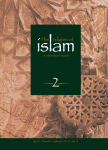The Religion Of Islam vol.2

The Stated Daily Prayers
The daily prayers are either Fard, Sunnah, nafl or witr. Fard prayer are those rak’âts, as are enjoined by God. Sunna, those founded on the practice of the Prophet; although they are desirable, they are not obligatory. Nafl prayers are the voluntary performances of two rak’âts, or more, which may be omitted without sin. Witr prayers are an odd number of rak’âts either one or three, side after the ‘isha or night service. These divisions of prayer are entirely distinct from each other. They each begin with the niyya (intention).
The five stated times of prayers are known as zuhr, ‘asr, maghrib, ‘isha and fair. There are also three voluntary periods called ishrâq, douha and tahajjud. The following table in the preceding page shows the exact number of rak’âts to be performed at each service:-
Table General Notes
1. A fresh ablution is necessary only when a man has answered a call of nature or has fallen asleep.
2. If there are socks on, and they have been put on after performing an ablution, it is not necessary to take them off: the wet hands may be passed over them. The same practice may be resorted to in case the boots are on, but it would be more decent to take off the boots when going into a mosque. It is, however, necessary that the socks be taken off and the feet washed about once every twenty-four hours.
3. The takbîr, i.e. the utterance of the expression Allâhu akbar (God is the Great) is to be repeated on assuming every form of the rak’a as explained heretofore. This repetition is deemed necessary to serve as a reminder to the worshipper to keep alive to his prayer by presenting his inner man and consciousness throughout the period of the prayers concerned.
4. Ghusl, or washing the whole body. Is a religious act of bathing the body after a legal impurity. It is founded upon the express injunction of the Koran (V – 9) which may be rendered in English as follows: “If you, i.e. the faithful and believers, are polluted then purify yourselves”. The traditions and the sayings of the Prophet relate the occasions on which the Prophet performed the ceremony of ghusl or bathing. The Muslim teachers of all sects are unanimous in prescribing the washing of the whole body after the following acts, which render the body junub or impure:
a) hayd (menses);
b) nifâs (puerperium);
c) jimâ’ (sexual intercourse);
d) ihtilâm (pollutio nocturna). It is absolutely necessary that every part of the body should be washed, otherwise the ghusl ceremony is rendered incomplete.
5. Guhsl masnûn or washing is meritorious, though not enjoined as an absolute Islamic necessity. Such washings are founded on the precept and practice of the Prophet, although they are not supposed to be a Divine institution. They are four in number: -
a) Upon the admission of a convert to Islam.
b) Before going to mosque to perform Friday prayer, and on the great two religious festivals, i.e. the two Bairams, the one occurring after the close of the fasting month of Ramadan, and the other on the day following that on which the pilgrims perform their pilgrimage.
c) After washing the dead.
d) After blood-letting.
6. The Friday prayer service.
7. The qunût.
